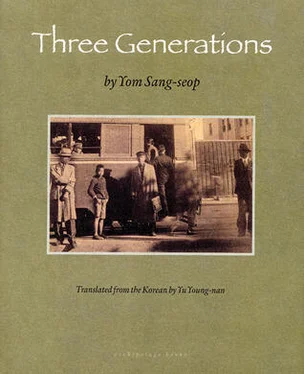Even on days when Byeong-hwa could have two meals, he had nothing else to do. The place where his comrades gathered was bleak, and the stove remained cold, so he wasn’t in the mood to go there only to gaze at the dust. Since the beginning of winter, they had been getting together at an inn where a few of his friends stayed but had suspended their meetings after a comrade’s arrest. For the time being, everyone was lying low, waiting to see how things developed. Byeong-hwa was bored by this forced hibernation, but he didn’t want to be arrested before he did his share of work.
He had been taking a lot of naps recently, probably because his body and soul were comfortable with enough firewood to heat his room and enough food to fill his stomach. After one of these naps, he opened his eyes and found Pil-sun looking down at him. The electric lights, which came on after dusk, had already switched on. Her presence must have woken him.
“Why are you sleeping so much? It’s dawn already,” she teased him. “Why don’t you get up and eat something?” Her sleeves were rolled up, her hands smudged. She must have been helping out in the kitchen after returning home from the factory.
“I’m sorry — I deserve your scolding. It’s cold outside, isn’t it? I’m sorry for sprawling out and snoring like this while others are working and trudging home in the cold.” Byeong-hwa kicked away his quilt, sat up, and bowed.
“You must still be half asleep. Wake up.”
“I’m wide awake, but. ” Byeong-hwa was about to make a joke but stopped himself and smiled. “Why is the room so warm? Did you heat it? I’m so ashamed — why don’t you eat my share of rice today? I wouldn’t dare grumble about it.” He stretched his arms out high and gave a big yawn. Byeong-hwa usually attended to the firewood for his own room, so he felt all the more ashamed that Pil-sun had taken care of it for him.
Like a mischievous child, Pil-sun pretended to press her fist into his yawning mouth. She giggled and said, “Look at this mouth! Look how it’s unwilling to eat! It’s all your fault, Mr. Lazybones, not your mouth’s. What mistake did this mouth make to be denied food? Why don’t you go over to the main room and eat?”
Pil-sun stopped short when she caught sight of the letter lying on the desk. “Are you going to mail a letter?”
“Yes, just leave it there.”
“Did you write about how thankful we are?”
“Yes, I said everyone was thankful, but only Pil-sun. ” He was going to joke that only Pil-sun failed to say thank you.
“Only Pil-sun what? What did you write?” Holding the letter, she shouted to Byeong-hwa, who had moved to the edge of the veranda. She wanted to know the rest and was somehow glad to see the four characters written on the envelope: Brother Jo Deok-gi.
“It’s nothing important. I just wrote, ‘Only Pil-sun badmouthed you.’ ”
“Why would I badmouth him? Why would I badmouth someone who has nothing to do with me?” She tried to sound flippant but sounded annoyed instead.
Byeong-hwa regretted his sillyness. “I was only joking.” He entered his room again.
“Why haven’t you mailed it?”
“I don’t have a stamp. Just leave it there, won’t you?” He snatched it away from her and put it in the pocket of his overcoat hanging on the wall.
“Shall I give you some money? I have three jeon.”
“If you have three jeon, why don’t you buy yourself some sweet potatoes?”
“Do you think I’m a child?”
“Grown-ups never eat sweet potatoes?” Byeong-hwa let out a giggle.
Byeong-hwa ate with the landlord. His wife had a meal tray taken to the room across from the main room, which she said was in disarray.
As they ate, Pil-sun’s father talked about Deok-gi. He had overheard Byeong-hwa and his daughter from the main room.
“I don’t say this because this food actually came from him, but he seems to be quite gentle and kind. I don’t know about his politics, but there is no harm in taking advantage of his generosity. Whatever our own feelings, we have no choice but to accept money from those who have money to give.”
Byeong-hwa made no reply and ate in silence.
Pil-sun’s father looked almost fifty, much older than his actual age, with a bushy salt-and-pepper mustache. His gauntness gave an impression of rectitude, but in truth he was a middle-aged man, not very capable, though friendly enough. Taking Byeong-hwa’s silence for disagreement, he elaborated.
“A while back, a wealthy man wanted to make a donation to a hospital for the poor in Japan. It was controversial. Some people didn’t want to accept it while others did, and in the end the donor withdrew his offer. I thought it wouldn’t have mattered if they’d taken the money. Regardless of whether or not the donor intended the gift as a means of appeasement, what is important is that you don’t get wooed over to the other side, seduced by such gestures. Look at it this way: that means of appeasement is like jumping into a fire with hay strapped to your back. Nothing stops you from fighting your enemy while eating the provisions he supplies. Such scruples are signs of the petit bourgeois, nothing else.”
“But when such a deed is known to the public,” Byeong-hwa finally answered, “the childish consciousness of the general public will be swayed, and that’s what the donor wants. It is therefore right, as a policy, not to accept it.”
“True, but such scruples are unnecessary in the case of Korea, where there’s no organizational base and where the use of illegitimate means is inevitable.”
“But what’s there to exploit in a young man like Deok-gi? His grandfather will die one of these days, and Deok-gi’s father will inherit his assets. If we want to talk his family into giving, we’d better work on his father.” Byeong-hwa said this as if he already had something in mind and added, “But will you make use of Deok-gi? Don’t take this seriously, but after he met Pil-sun, he said that he’d like to pay for her education because it’s a pity that she is wasting her time in a factory.”
“Education?” Pil-sun’s father raised his head but said nothing further.
“What do you think?”
“Well, I’d like to send her to school when we become a little better off, so that she can make a living. But how can we trust such a young man?”
“You sound different now than you did a moment ago, when you talked about taking advantage of them.” Byeong-hwa smiled, but he wasn’t unaware of his landlord’s feelings.
The landlord was about to explain, but he stopped abruptly when he heard someone coming out of the main room, probably Pil-sun getting rice tea in the kitchen.
The landlord was not much of an activist nowadays, but seven or eight years ago he had been a member of the first group of dissidents who went to prison. Now, well over forty, he was, in a sense, over the hill. He was too impoverished to feed his family, and it was impossible for him to get a job given his background, so he idled away his time, living on what his daughter brought home. But he wasn’t completely resigned. He didn’t want his daughter to follow in his footsteps — he wanted her to have a decent life. After supporting her family for several years, as a son would, she would be married off to a good family. It would have been nice if he could have sent her to school like other girls, as she herself wanted, so that she could at least become an elementary school teacher, but she had to leave secondary school in her second year after her family’s financial collapse. Being able to continue her studies would have brought Pil-sun great joy.

Читать дальше













